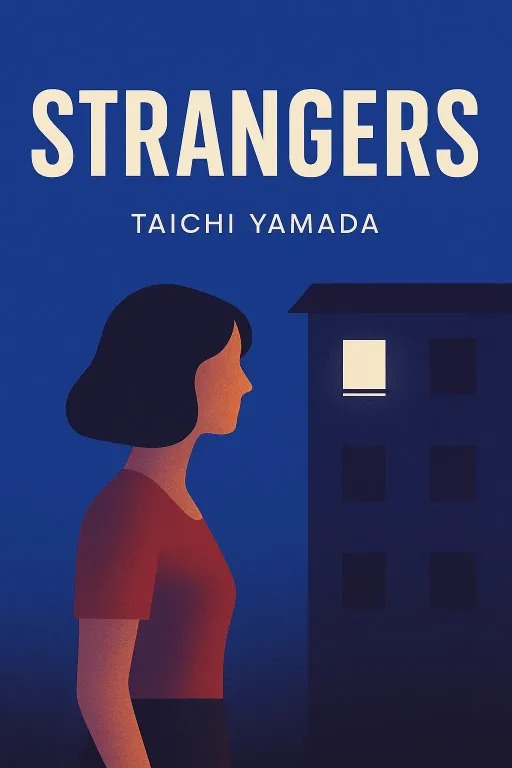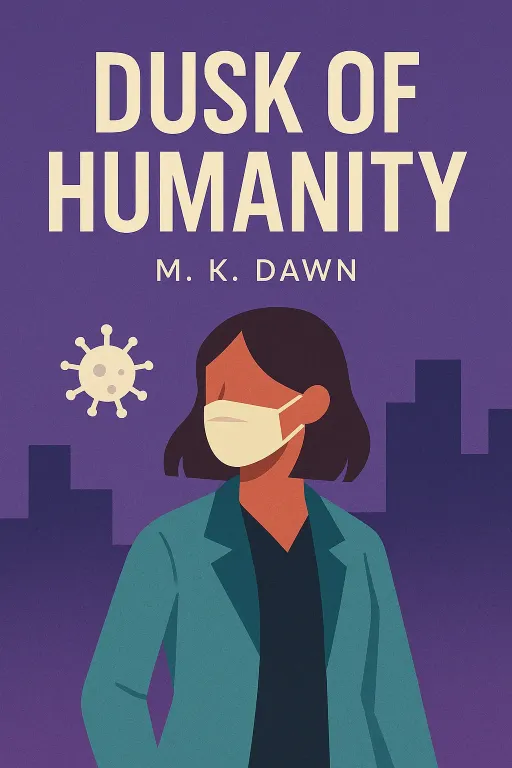
Strangers
10 minIntroduction
Narrator: Imagine living in a sprawling Tokyo apartment complex, yet feeling an unnerving, absolute silence. For Hideo, a recently divorced screenwriter, this silence is more than just a lack of noise; it's a presence, a creeping realization that he is utterly alone. One night, driven by this oppressive quiet, he investigates and confirms his suspicion: out of dozens of units, only his is occupied. Or so he thinks. This chilling discovery marks the beginning of a descent into a world where loneliness is a doorway, and the ghosts of the past are not just memories, but tangible, hungry entities. In Taichi Yamada's haunting novel, Strangers, the lines between grief, reality, and the supernatural blur, asking a terrifying question: what happens when our deepest longings are answered by the dead?
The Unsettling Silence of Solitude
Key Insight 1
Narrator: The novel opens by immersing the reader in the protagonist Hideo's profound isolation. Living in his office apartment after a divorce, he is a man adrift. Initially, the roar of the adjacent highway is a constant torment, but as he adapts, a new, more disturbing sound emerges: the sound of nothing. The building, which should be bustling with life, is eerily still. This quietness becomes an obsession, leading him to explore the darkened hallways and empty parking lot late one night. He confirms that he is the sole resident, a king in a concrete castle of solitude. This realization brings a strange mix of fear and a childlike sense of freedom.
However, his solitude is soon shattered. First, a TV producer and old colleague, Mamiya, pays an unexpected visit. Instead of discussing work, Mamiya delivers a stunning personal blow: he intends to pursue a relationship with Hideo's ex-wife, Ayako. This betrayal deepens Hideo's sense of isolation, making him feel cut off from his professional and personal past. Almost immediately after Mamiya leaves, the intercom buzzes. It’s a woman from the third floor, Kei. She appears at his door, drunk and holding a bottle of champagne, confessing her own crushing loneliness. She reveals a startling fact: "Did you know? That by around this time most nights, you and I are the only two people left in thebuilding?" Preoccupied and emotionally raw from Mamiya's confession, Hideo turns her away, a decision that plants a seed of guilt and concern. These initial chapters masterfully establish Hideo's vulnerability, a man so starved for connection that he becomes a magnet for the strange and the sorrowful.
The Ghosts of Asakusa
Key Insight 2
Narrator: Haunted by his loneliness and the recent betrayal, Hideo decides to spend his 47th birthday by returning to Asakusa, the neighborhood of his childhood. It’s a place he has avoided for decades, a place saturated with the memory of his parents, who died in a tragic accident when he was only twelve. The visit is a pilgrimage into his own grief. As he wanders the streets, he finds himself drawn to the Asakusa Variety Hall, a place of cheap entertainment.
Inside, amidst a dwindling audience, something impossible happens. Hideo hears a familiar laugh, a sound that echoes his father's. He turns and sees a man who is the spitting image of his father, not as an old man, but exactly as he was at the age he died. The man smiles and nods, a gesture of recognition that defies all logic. Overwhelmed and disoriented, Hideo is beckoned by this stranger to leave the hall. He follows, acting on an impulse that overrides reason. This encounter is the novel's pivotal turn, where the psychological drama of a lonely man bleeds into a full-blown supernatural horror. The ghosts are no longer confined to memory; they are walking the streets of Tokyo, and they seem to know his name.
A Family Reborn
Key Insight 3
Narrator: Hideo follows the man who looks like his father through the deserted streets of Asakusa to a small, shabby apartment. The experience is surreal, dreamlike. Inside, another shock awaits him. The man’s wife emerges, and she is the perfect image of his mother, also frozen in time at the age she died. They welcome him not as a stranger, but with an unnerving, casual familiarity. They offer him beer, chat about their day, and treat him as if he has simply been away for a while.
Hideo is caught in a state of cognitive dissonance. He knows this is impossible. His parents are dead. Yet, the warmth, the conversation, and the sheer physical reality of their presence are intoxicating. He feels a sense of comfort and belonging he hasn't known since he was a child, a feeling so powerful it begins to dissolve his skepticism. When his "mother" casually mentions that her husband works in Shintomicho, the same place Hideo's father worked, the illusion becomes almost complete. However, the visit ends in terror. As he prepares to leave, he asks their names, and his mother replies with a chillingly gentle question: "What child asks his own parents their name?" The implication is clear: they believe he is their son. Hideo flees in a panic, his mind reeling from the encounter that was both a dream come true and a terrifying violation of natural law.
The Price of Comfort
Key Insight 4
Narrator: Despite the terror, Hideo cannot stay away. The comfort of his parents' presence is a powerful drug for his lonely soul. He begins visiting them regularly, falling into a routine of playing cards, sharing meals, and basking in their unconditional love. He is aware that this might be a hallucination, a product of his own fractured mind, but he decides that even an imaginary comfort is better than none. He chooses to embrace the fantasy.
But this comfort comes at a terrible price. His new lover, Kei, begins to notice a disturbing change in him. She tells him he looks "dreadful," like "skin and bones." Mamiya, his former colleague, runs into him and is shocked by his emaciated appearance, urging him to see a doctor. Yet, when Hideo looks in the mirror, he sees his normal, healthy self. The discrepancy is horrifying. He is being drained of his life force, but he is blind to his own decay. The story draws on folklore where spirits of the dead feed on the vitality of the living. His parents are not malevolent; they seem blissfully unaware of the harm they are causing. Their love is literally consuming him. The climax of this realization comes when Kei, in a desperate attempt to save him, drags him to a mirror and pleads for him to see the truth. In that moment, the veil drops, and Hideo sees his reflection for what it is: a gaunt, hollow-eyed old man on the verge of death.
The Final Farewell and a Chilling Revelation
Key Insight 5
Narrator: Realizing he is dying, Hideo knows he must sever the connection. He visits his parents one last time, not in their apartment, but at a sukiyaki restaurant, determined to say a final goodbye. The dinner is bittersweet, filled with the warmth and love he craved, but shadowed by the impending separation. As the meal ends, his parents begin to fade. They express their love and pride for him before vanishing completely, leaving him alone with the bill and a profound sense of loss. He has finally let them go.
But his ordeal is not over. Back at the apartment building, Mamiya confronts him with a horrifying story. Worried about Hideo, Mamiya had spoken to the building manager and learned that the previous tenant of apartment 305—Kei's apartment—was a woman who had committed suicide. He had then witnessed Hideo and a transparent-looking Kei entering the now-empty office space. As Mamiya finishes his story, Kei appears in the hallway. Her warmth is gone, replaced by a cold hatred. She reveals her true nature: she is the ghost of the woman who killed herself, a lonely spirit who intended to drag Hideo down into death with her. But she failed. "By the time you came out of the apartment," she tells him, referring to his final visit with his parents, "at heart you were no longer with me." His love had shifted, breaking her hold. With a final, sorrowful look, she too fades away, leaving Hideo truly, and finally, alone.
Conclusion
Narrator: Taichi Yamada's Strangers is a masterful exploration of how grief and loneliness can warp reality, making us dangerously susceptible to the phantoms of our own making. The book's most powerful takeaway is that the deepest hauntings come not from malevolent spirits, but from our own desperate need for connection. Hideo's story is a chilling reminder that the comfort we seek in the past can become a prison, one that consumes our present and destroys our future.
The novel leaves us with a haunting question: in the face of unbearable loss, is a beautiful, life-draining lie preferable to the cold, lonely truth? Strangers suggests that choosing the lie, no matter how comforting, is a path to self-destruction, and that true peace can only be found by confronting our ghosts and, however painfully, letting them go.


